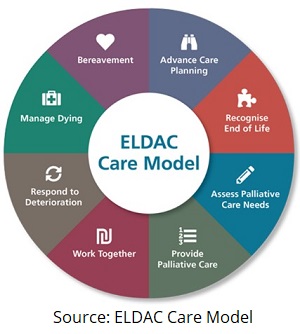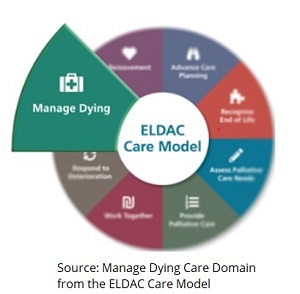The ELDAC Home Care Toolkit: Resources to manage dying at home
A blog post written by Professor Deborah Parker, UTS Lead & Residential Aged Care Toolkit and Home Care Toolkit Lead and Dr Holly Mack, Residential Aged Care Toolkit and Home Care Toolkit Developer, ELDAC
The ELDAC Home Care Toolkit is available online through the ELDAC website (www.eldac.com.au) and  connects aged care staff working in home and community care with tools and resources to deliver quality palliative care and advance care planning. The collection of information helps users develop a plan to follow evidence based recommendations; access educational resources, and progress quality improvement strategies. The toolkit is organised into three main sections so it’s easy to locate information: Clinical Care, Education and Learning, and Organisational Support.
connects aged care staff working in home and community care with tools and resources to deliver quality palliative care and advance care planning. The collection of information helps users develop a plan to follow evidence based recommendations; access educational resources, and progress quality improvement strategies. The toolkit is organised into three main sections so it’s easy to locate information: Clinical Care, Education and Learning, and Organisational Support.
Clinical Care
The Clinical Care section delivers clinical information and guidance in providing palliative care and advance care planning. This section includes evidence based resources available to use with clients and their families that has been reviewed by experts in aged and palliative care. There are clinical tools, forms, and templates to assist with assessing palliative care needs. Also provided are factsheets and other resources that are downloadable and printable to hand out and review with clients and their families.
The Clinical Care section is designed around the ELDAC Care Model, which outlines eight clinical domains that should be considered for end of life care:
- Advance Care Planning
- Recognise Dying
- Assess Palliative Care Needs

- Provide Palliative Care
- Respond to Deterioration
- Manage Dying
- Bereavement
Resources from the Clinical Care section, Manage Dying domain are highlighted below.
Manage Dying
The Manage Dying clinical care domain within the Clinical Care section of the toolkit has resources to assist you in recognising that someone is imminently dying, and to provide support for dying clients and their families at home.
Recognising Dying and Planning for a Home Death
While individuals may differ in their signs and symptoms of dying there are some common indicators that a client might be in their final days of life, which are summarised under the Manage Dying domain. This sub-section also has links available to a CareSearch checklist for supporting clients and families planning an expected home death. The main topics covered are: Clarifying expectations and support; assessing the home situation; planning for symptom management; and information that families need.
Talking about Dying
Talking about death and dying can be difficult and the Manage Dying care domain has resources on what to say when someone is approaching the end of life and to support clients’ families as their loved one approaches death. There are links to CareSearch factsheets that have useful phrases for discussing the process of death and dying, along with links to palliAGED Practice Tips on talking about dying for nurses and careworkers.
End of Life Medications
Assessment and management of symptoms are critical for dying clients to ensure they are as comfortable as possible at their end of life. The Manage Dying domain includes links to guides on medications, their indications and suggested dose; along with information on syringe drivers and subcutaneous medication administration.
After a Client has Died
There are legal regulations and laws concerning death certification and coronial procedures following a home death, which varies based on state or territory. The Manage Dying domain links to CareSearch resources for after-death care and to palliAGED Practice Tip sheets on after death choices for nurses and careworkers.
Family Resources
The Manage Dying domain provides information to discuss with clients and their families as the end of life approaches. There are links to resources explaining the dying process, including changes the family might notice; preparing and caring for the end; how to know that death has occurred; immediately following a death; and family issues at the end of life.
Education and Learning
Additionally, the Home Care Toolkit includes an Education and Learning section with materials for building individual and organisational knowledge and capacity in providing care for older people nearing the end of life. The ELDAC Personal Learning Assessment and ELDAC Personal Learning Plan are tools for staff to evaluate their specific learning needs and develop tailored educational goals. Links are available to online training modules to help improve skills, understanding, and confidence in palliative care and advance care planning.
Organisational Support
The Home Care Toolkit has an Organisational Support section to assist multidisciplinary teams in strategies for palliative care and advance care planning. A coordinated approach is outlined across four areas: Support Systems; Quality Improvement; Standard and Funding; and Work Together. This section contains resources for home care services to develop, implement, monitor and sustain palliative care and advance care planning objectives. These include the ELDAC Organisational Audit, ELDAC After Death Audit and the Advance Care Planning Continuous Quality Improvement Audit Tool. The toolkit also identifies and addresses topics that can assist home care staff and services in meeting the Aged Care Quality Standards.
The ELDAC Home Care Toolkit is designed for health professionals and care staff providing palliative care and supporting advance care planning for older Australians living at home with advanced life-limiting illnesses, their families and carers. The toolkit is updated regularly so check back often for the latest evidence based information and new interactive resources.

Professor Deborah Parker, UTS Lead & Residential Aged Care Toolkit and Home Care Toolkit Lead, ELDAC

Dr Holly Mack, Residential Aged Care Toolkit and Home Care Toolkit Developer, ELDAC